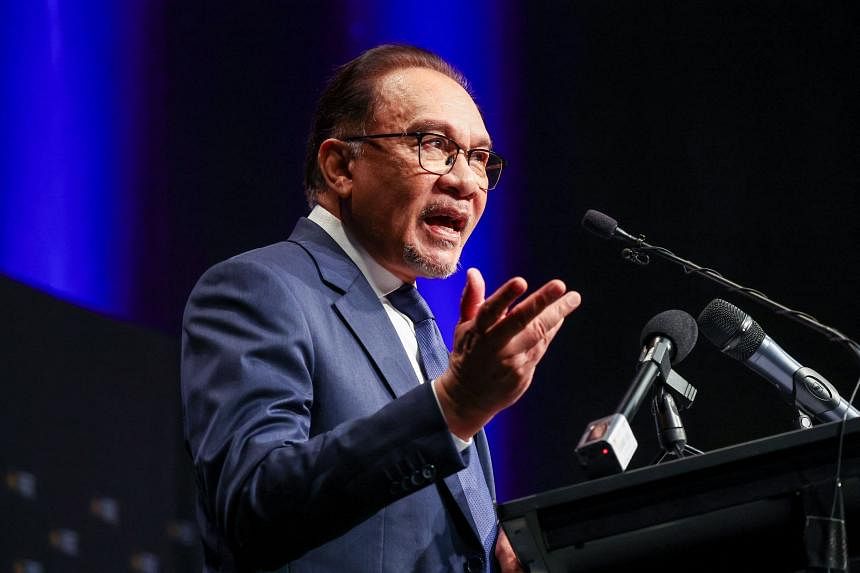KUALA LUMPUR - Malaysia could backtrack on plans for major changes in citizenship qualifications after a revolt by lawmakers in Prime Minister Anwar Ibrahim’s Pakatan Harapan (PH) coalition.
One of the constitutional amendments proposed is a widely lauded move to allow both mothers and fathers to pass on their Malaysian citizenship to their children born overseas. But the other, which will tighten rules on citizenship, including for abandoned babies, will result in thousands ending up stateless, say critics.
The Straits Times has learnt that a swathe of MPs from PH have expressed deep misgivings at briefings since Home Minister Saifuddin Nasution confirmed on March 8 that the Cabinet had given the green light for the Bill to be tabled in Parliament. PH leads the multi-coalition government, and has long campaigned on a platform of progressive reforms.
The new rules would remove citizenship rights for stateless children born in Malaysia, foundlings and children of permanent residents; lower the age limit of childhood citizenship applications to 18 from 21; and deprive foreign wives of citizenship if the marriage is dissolved within two years of becoming Malaysian.
The MPs’ concerns revolve in particular around how abandoned children – especially if their parentage cannot be ascertained – would end up stateless and be denied basic education and other rights enjoyed by citizens. The government has said 256 babies were abandoned between 2020 and 2022.
Constitutional amendments require a two-thirds supermajority – 148 in the 222-strong chamber – which Datuk Seri Anwar enjoys, thanks in part to six defectors from the opposition.
It is unclear exactly how many of PH’s 81 elected lawmakers are against the controversial Bill, which has also been widely criticised by civil society and Malaysia’s Human Rights Commission.
Checks by ST indicate that the majority of MPs from the Democratic Action Party, the largest outfit in government, are in dissent, as well as a significant number of the 31 MPs from Mr Anwar’s own Parti Keadilan Rakyat.
Among those who have openly opposed the changes are former deputy minister Ramkarpal Singh, who reminded Parliament on March 5 that Malaysia has committed to the United Nations to reduce statelessness, which the amendments would make harder to fulfil.
According to some who attended the briefings, a PH deputy minister has threatened to resign if the Bill, initially set to be presented on March 25, is passed.
“It’s one thing when questions are asked about our commitment to our reformist agenda,” one PH lawmaker told ST, referring to criticism about the pace of reforms since Mr Anwar took power more than 15 months ago. “But it’s another when we are making regressive changes.”
A failure to get two-thirds of the vote, or if PH lawmakers go rogue even if the Bill gains backing from the opposition, would be a major blow to the Premier amid lingering concern about the stability of his ruling pact of disparate allies.
Even withdrawing the Bill would be seen as a major climbdown as Prime Minister Anwar had as recently as March 12 expressed confidence in its passage.
“Please follow (the) development at home... Your question has been overtaken by events. Cabinet has agreed to bring this to Parliament this month,” he said when answering a question at a dinner with the Malaysian diaspora in Berlin about citizenship rights of children born abroad to Malaysian mothers.
But he did not address the other changes.
“These are the most regressive proposed amendments in the last 50 to 60 years,” said human rights commissioner Ragunath Kesavan on March 13. “(Statelessness) will perpetuate a cycle of poverty and may force them (those stateless) into a life of crime”.
Speculation among political insiders is that these were concessions made to certain quarters, such as conservative nationalists, termed by some as a “deep state” in the civil service who want to maintain the status quo and resist reforms, and the eastern state of Sabah.
Sabah has long grappled with large numbers of undocumented migrants and those with dubious citizenship. Its population has ballooned by over four times since 1980, when less than a million people lived in the state on the north-eastern tip of Borneo.
The Home Ministry has also briefed lawmakers that the amendments have gained the assent of the Conference of Rulers – made up of the nine constitutional monarchs who reign in their respective states – but well-placed sources told ST that upon further presentations by other parties, some have asked that the Bill be reviewed.
Meanwhile, PH backbenchers say alternative proposals, such as decoupling the amendments so that the one giving foreign-born children of Malaysian mothers citizenship can be passed first, were rejected by the Home Ministry.
Other suggestions, such as allowing foundlings to gain permanent resident status so they can enter public schools while awaiting a decision on their citizenship, or including only the safeguards against marriages of convenience and the lowering of the age limit for childhood citizenship applications, were also refused.

